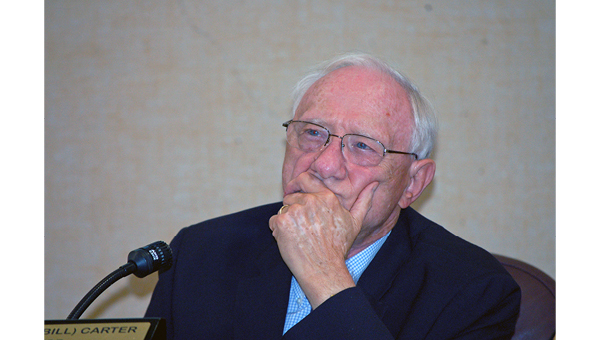Biblical principles on partaking of the Lord’s Supper
Published 8:43 am Friday, June 7, 2019
BY TONY HOSS
Question: Should Christians partake of the Lord’s Supper and if so, when?
The previous question demands great thought and study. The answer will be in two parts. This week we begin by examining and establishing Biblical authority.
Answer: Many denominations observe the Lord’s Supper monthly, quarterly, semi-annually or annually. Some observe it only on special holy days. Then there are others who observe the Lord’s Supper on weekdays or whenever they feel it convenient. Many today teach that partaking of the Lord’s Supper is simply a matter of personal conscience, and not a matter of right or wrong. While it is sad, it is true that some members of the church will go weeks at a time not attending when the saints commune, even when they could come. This shows they don’t really view participating each first day of the week as being important.
If we truly want to fulfill all the requirements of the New Testament, including the Lord’s Supper, we must understand the principle of Bible Authority. This means we must have Bible authority for everything we do in service to God and that we will not engage in any practice in God’s service unless we find it taught in the New Testament. Likewise, if God’s Word says to do a thing, we must do it just as He says and not change it. (Matthew 15:9, Galatians 1:8-9, 2 John 9).
In 2 Timothy 3:16-17, Paul teaches that the Bible is a complete and perfect guide to everything God wants us to do. Many individuals try to allow that which is ungodly stating that God’s Word does not disallow certain things. However, we must remember when God tells us to do something or not do something, then everything else is wrong. If God instructs us to meet upon the first day of the week to worship Him, we then must conclude that it is wrong to meet on any other day of the week as if it were the first day of the week. This does not prevent us from worshipping God any other day of the week but demands that we meet upon the first day to fulfill the requirements of worship. Simply put, if God says to do one thing, and we do something else, then we are following human doctrines and a different gospel, so our worship is vain, and we have not God. Consider the following:
Concerning the Lord’s Supper, we cannot use cornbread and buttermilk in the Lord’s Supper because God told us to use unleavened bread and fruit of the vine. When it comes to baptism we cannot sprinkle or pour water as a form of baptism because New Testament baptism is a burial (immersion). The word itself meant to fully immerse. We should not baptize babies because God’s Word teaches us that people must understand, believe, repent, and confess before baptism; babies cannot fulfill those requirements. There are many other acts that people follow that are wrong because there is no Bible authority for them.
If we find in the New Testament, God’s authority concerning The Lord’s Supper, we must adhere to it in order to comply with God’s commands. If God instructs us to partake of the Lord’s Supper upon a certain day but we observe it on another day we then are observing the Lord’s Supper by mankind’s authority and not God’s. This would violate Bible teaching just as surely as the other examples we have mentioned.
When we consider submission to God we must know that God instructs us in no less than three methods. First, God can give us direct commands. Second, God can instruct us to do a thing by necessary inference and third, He can instruct us to do a thing by Apostolic example. There is no doubt that when Jesus speaks, we are to listen and to adhere to His teachings. When Jesus in Matthew 19 taught that we are to have one spouse it is obvious what He meant; this is a direct command. Then when the apostle Paul commanded that an Elder must be the husband of one wife we then infer that elders in the church must be men because only men can be husbands in the Biblical sense. Another case of inference concerns the Sabbath day. Nowhere are we told explicitly that the Sabbath has been done away with. However, we learn in Col. 2:14 that Christ has blotted “out the handwriting of ordinances that was against us.” This included sabbath day worship and is an inference. The New Testament is filled with examples taken as authority in our obedience to God. While baptism is commanded, we have a long list of examples of first century individuals who submitted to baptism. Their example is instruction for us today. Another example as a command is found in multiplicity of Elders. There is no direct command to have multiple Elders in a congregation but we observe this command because of the example of the first century church and apostolic writings.
Next week I will continue this discussion and directly apply the previous principles to the subject of the Lord’s Supper.
(Tony Hoss is minister at Centerview Church of Christ, Elizabethton.)






